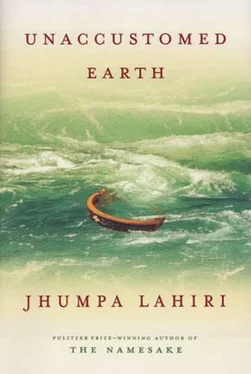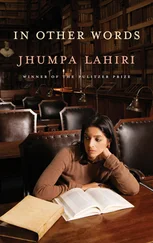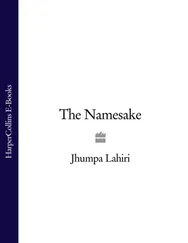"She's the reason they're still here," my mother said. "She won't settle for anything less than a palace."
"It's no easy task," my father said diplomatically, "starting a new job, a new way of life all over again. My guess is she didn't want to leave, and he's trying to make up for that."
"You would never put up with that sort of behavior in me."
"Let it go," my father said, turning away from her and tucking the covers under his chin. "It's not forever. They'll leave soon enough and then all our lives will go back to normal."
Somewhere, in that cramped house, a line was drawn between our two families. On one side was the life we'd always led, my parents taking me to Star Market every Thursday night, treating me to McDonald's afterward. Every Sunday I studied for my weekly spelling test, my father quizzing me after 60 Minutes was over. Your family began to do things independently as well. Sometimes your father would come home from work early and take your mother out, either to look at properties or to shop at the mall, where slowly and methodically she began to buy all the things she would need to set up her own household: sheets, blankets, plates and glasses, small appliances. They would come home with bags and bags, amassing them in our basement, sometimes showing my mother the things they'd bought, sometimes not bothering. On Fridays your parents often took us out to dinner, to one of the overpriced mediocre restaurants in town. They enjoyed the change of pace, having mysteriously acquired a taste for things like steak and baked potatoes, while my parents had not. The outings were intended to give my mother a break from cooking, but she complained about these, too.
I was the only one who didn't mind your staying with us. In my quiet, complicated way I continued to like you, was happy simply to observe you day after day. And I liked your parents, your mother especially; the attention I got from her almost made up for what I didn't get from you. One day your father developed the photographs from your stay in Rome. I enjoyed seeing the prints, holding them carefully by the edges. The pictures were almost all of you and your mother, posing in piazzas or sitting on the edge of fountains. There were two shots of Trajan's Column, nearly identical. "Take one for your report," your father said, handing me one. "That should impress your teacher." "But I wasn't there."
"No matter. Say your uncle went to Rome and took a snap for you."
You were in the picture, standing to one side. You were looking down, your face obscured by a visor. You could have been anyone, one of the many passing tourists in the frame, but it bothered me that you were there, your presence threatening to expose the secret attraction I felt and still hoped would be acknowledged somehow. You had successfully wiped away all the other crushes I harbored at school, so that I thought only of being at home, and of where in the course of the afternoon and evening our paths might intersect, whether or not you would bother to glance at me at the dinner table. Long hours were devoted, lying on the cot in my parents' room, to imagining you kissing me. I was too young, too inexperienced, to contemplate anything beyond that. I accepted the picture and pasted it into my report, but not before cutting the part with you away. That bit I kept, hidden among the blank pages of my diary, locked up for years.
Your wish for snow had not been granted since you'd arrived. There were brief flurries now and again, but nothing stuck to the ground. Then one day snow began to fall, barely visible at first, gathering force as the afternoon passed, an inch or so coating the streets by the time I rode the bus home from school. It was not a dangerous storm, but significant enough to break up the monotony of winter. My mother, in a cheerful mood that evening, decided to cook a big pot of khichuri, which she typically made when it rained, and for a change your mother insisted on helping, standing in the kitchen deep-frying pieces of potato and cauliflower, melting sticks of butter in a saucepan for ghee. She also decided that she wanted, finally, to make the long-promised trifle, and when my mother told her that there weren't enough eggs your father went to get them, along with the other ingredients she needed. "It won't be ready until midnight," she said as she beat together hot milk and eggs over the stove, allowing me to take over for her when she tired of the task. "It needs at least four hours to set."
"Then we can have it for breakfast," you said, breaking off a piece of the pound cake she'd sliced, stuffing it into your mouth. You seldom set foot in the kitchen, but that evening you hovered there, excited by the promise of trifle, which I gathered you loved and which I had never tasted.
After dinner we crowded into the living room, watching the news as the snow continued to fall, excited to learn that my school would be closed and my father's classes canceled the next day. "You take the day off, too," your mother said to your father, and to everyone's surprise he agreed.
"It reminds me of the winter we left Cambridge," your father said. He and your mother were sipping their Johnnie Walker, and that night, though my mother still refused, my father agreed to join them for a small taste. "That party you had for us," your father continued, turning to my parents. "Remember?"
"Seven years ago," my mother said. "It was another life, back then." They spoke of how young you and I had been, how much younger they had all been.
"Such a lovely evening," your mother recalled, her voice betraying a sadness that all of them seemed to share. "How different things were."
In the morning icicles hung from our windows and a foot of snow blanketed the ground. The trifle, which we had been too tired to wait for the night before, emerged for breakfast along with toast and tea. It was not what I'd expected, the hot mixture I'd helped beat on the stove now cold and slippery, but you devoured bowl after bowl; your mother finally put it away, fearing that you would get a stomachache. After breakfast our fathers took turns with the shovel, clearing the driveway. When the wind had settled I was allowed to go outside. Usually, I made snowmen alone, scrawny and lopsided, my parents complaining, when I asked for a carrot, that it was a waste of food. But this time you joined me, touching the snow with your bare hands, studying it, looking happy for the first time since you arrived. You packed a bit of it into a ball and tossed it in my direction. I ducked out of the way, and then threw one at you, hitting you in the leg, aware of the camera hanging around your neck.
"I surrender," you said, raising your arms. "This is beautiful," you added, looking around at our lawn, which the snow had transformed. I felt flattered, though I had nothing to do with the weather. You began walking toward the woods and I hesitated. There was something you wanted to show me there, you said. Covered in snow on that bright blue-skied day, the bare branches of the trees concealing so little, it seemed safe. I did not think of the boy, lost there and never found. From time to time you stopped, focusing your camera on something, never asking me to pose. We walked a long way, until I no longer heard the sounds of snow being shoveled, no longer saw our house. I didn't realize at first what you were doing, getting on your knees and pushing away the snow. Underneath was a rock of some sort. And then I saw that it was a tombstone. You uncovered a row of them, flat on the ground. I began to help you, unburying the buried, using my mittened hands at first, then my whole arm. They belonged to people named Simonds, a family of six. "They're all here together," you said. "Mother, father, four children."
"I never knew this was here."
"I doubt anyone does. It was buried under leaves when I first found it. The last one, Emma, died in 1923."
Читать дальше












